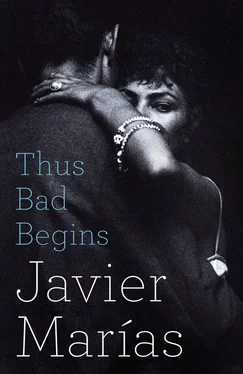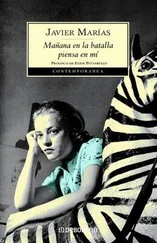No one gave any importance to the fact that he had completed his medical degree when he was only twenty, in 1940, the first year after the victory, when the universities had been closed for the three years that the War had lasted; that when he was twenty-three (my age at the time), he had been appointed Assistant Paediatrician at the Hospital de San Carlos; or that when he was thirty-one he had been able to open his own surgery, which met with immediate success and acclaim, in the then relatively new Clínica Ruber, founded in 1942 by the very franquista and very clever doctors-cum-impresarios Ruiz and Bergaz, who combined the first letters of their two surnames to give the clinic its absurd title. Or maybe it was simply that no one knew, just as in the years of the Transition, people preferred to ignore or deny the past lives of many individuals opposed to the regime — whose opposition only began at some early or late moment in slow-moving time — whose trajectory was considered impeccable, especially if they were confident and distinguished, not to mention vociferous. No one bothers to trace the steps or origins of someone they admire and respect, still less if they owe them a debt of gratitude. No one noticed either that Van Vechten had always enjoyed prestige, reputation and money. It was assumed he had earned this through hard work, talent, dedication and effort.
Of course, I knew nothing of all this when Muriel charged me with that task. I knew only of Van Vechten’s excellent reputation as a doctor and that he had selflessly given aid to those victims of political reprisals who lacked the means to pay him, or so people said and so anyone would tell you if asked. It was easy enough to check the facts of his biography and career, but no one bothered, even though they were there for all to see in Spanish encyclopaedias, Durban, for example, or even in the most recent edition of Who’s Who in Europe , which I found in the British Institute library in Calle Almagro; I was surprised to see his name there, I didn’t know at the time that there are various short cuts you can take in order to appear in almost any list of important people, if you’re determined enough. It was because of the mission Muriel had given me that I decided to find out exactly who I was trying to entrap, hoping to find some more justification for what I was about to do. That’s what I didn’t like, having to drag him along with me and observe him, with the intention of informing Muriel about his behaviour, especially with women. Even though I didn’t much like doing this (right from the start, I could have given my boss some very concrete facts about how, where and who Van Vechten was screwing, at least on that one afternoon, but I had decided to keep quiet about that or keep it to myself for the moment); even though Muriel had been told an ugly story from the past and now harboured grave reservations about Van Vechten that troubled him deeply and threatened their friendship; even though I soon learned that the Doctor had clearly had certain links with the regime in the remote or not so remote past (possibly merely passively or by silent consent; after all, what else could they do, the majority of those who felt unable to give up prospering or growing rich for forty years, it took real guts to abandon all hope), but what I really disliked was the idea of deceiving someone from the outset, of offering him a camaraderie based entirely on someone else’s initiative — I mean, why on earth would I choose as a companion on my nights out a sixty-year-old man, even one who looked ten years younger? — and which was completely false from top to bottom. Not only because that camaraderie was feigned, but because behind it lay an ulterior motive, a desire to unmask him, the setting of bait with which to tempt him.
I realized how uncomfortable it is being a spy, however worthy the cause, and in this situation, I wasn’t even sure what the cause was, I was simply following orders. There is something base, something grubby about passing yourself off as someone else, about behaving in an underhand manner, gaining the confidence of someone in order to betray him, even if that person is a villain, an enemy, a murderer. That is the job of moles and infiltrators, of the secret or double agents who inhabit every sphere of society, even the most innocuous; of the policemen who sometimes spend years working, for example, for a terrorist organization or a mafia, as if they were just another member of the gang. They must be thoroughly convinced of the ultimate nobility of their job, they must think every day, when they get up and when they go to bed, that thanks to their imposture, lives will be saved and crimes averted. And yet, I thought, I could not be one of them. Perhaps it’s a matter of training and practice and habit, of feeding an already existing hatred; of developing a sense of righteous indignation, of severity and indifference and hardness of heart, a renunciation of any finer feelings for those around you, or modifying or neutralizing your conscience. I imagine I would have felt guilty when I saw the criminal or fanatic growing fond of me, gradually abandoning his suspicions and becoming ever-more confiding, when I saw that he genuinely liked me, possibly, in the long term, unconditionally, if such people have such feelings. I suspect that they do, since feelings of loyalty and friendship are within everyone’s grasp, even a ruthless, malicious monster. Who doesn’t have a soft spot for someone, a lover, a daughter, a colleague, a comrade?
I had no difficulty whatsoever in persuading Van Vechten (‘persuade’ is hardly the right word). It was child’s play really and he was the child, which only added to my bad conscience. In those days of permissiveness and freedom, which had been going on for quite a while, even some years before Franco died, it was not unusual for men of previous generations to regard us youngsters with amazement and envy, imagining that we led a wild, unruly existence, something to which they had aspired in vain in their stricter, more confined youth. On one occasion, at a card game to which Muriel invited me, along with other people of his age or even slightly older (I remember there was a bullfighter and an actor there, men who, all things considered, had not exactly lacked opportunities for a certain amount of old-fashioned professional promiscuity, now long since past), their curiosity centred on me for a few minutes, because of my youth. I discovered that, because they thought me good-looking, they took it for granted, with touching ingenuousness, that I spent my nights hopping from bed to bed — that’s what they said — screwing away to my heart’s content. And the most ingenuous or perhaps the most lustful, the most prurient, was Van Vechten, who, in the cheerily frank tone he occasionally adopted — but only occasionally — concluded this brief interrogation or display of old men’s fantasies by asking me point-blank:
‘So, young De Vere.’ This was the way in which Muriel introduced me and how all his friends addressed me, at least initially. ‘You’re a handsome lad, so tell us all, in confidence, of course: given the age we live in, with all these liberated young women around, how often do you get laid a month, more or less? In a good month, that is. I shouldn’t think you ever stop.’ And he awaited my response with a salacious look in his eyes, anticipatorily greedy and amazed, I could have given him any number, and he would have swallowed it down enthusiastically. They all imagined a world that did not exist or only among the more active and fortunate of huntsmen, just as in any other age, although things were certainly a lot easier then: a world with no moral restrictions or hindrances, a kind of neopaganism as portrayed in certain scandalous, pseudo-artistic films, of which there was a veritable plague in European cinemas at the time and to which those men would flock, not to Jess Franco’s films, but to the more famous ones that they would find easier to justify seeing. As I said, there was no AIDS at the time or no one knew of its existence, and so there was no fear and no precautions taken. It was a privileged time in that respect, a time that has not so far returned.
Читать дальше












